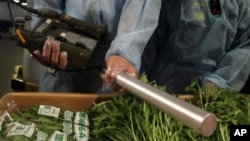The Japanese government is trying to fight against growing concerns that food from Japan is not safe.
At a meeting of the Association of Southeast Asian Nations in Jakarta, Indonesia Saturday, Japan's Foreign Ministry insisted radiation levels in the country's food had dropped significantly.
Ministry spokesman Satoru Satoh said radiation levels were high in the week following the earthquake and tsunami but have been dropping since then.
Thailand Saturday became the latest country to ban some food imports from Japan. Thai officials said their ban on produce, milk, eggs and meat from some Japanese prefectures would go into effect Monday.
The United States banned all dairy products and fruits and vegetables from four Japanese prefectures in late March. China had banned all food imports from five prefectures, and on Friday included a further seven prefectures in the ban. Canada, Russia, Australia, Singapore and others have followed suit.
Earlier this week, the Indian government said it will not implement a ban against food imports from Japan, despite concerns.
A Commerce Ministry official, who did not want to be named, told reporters on Thursday that India will allow Japanese imports, but they must be screened for radiation contamination,
To help allay concerns, Japan has said it will provide countries with information on where foods had been produced and on the level of radiation in the atmosphere, water and soil in those areas.
A plunge in food exports is just one of the many woes Japan has faced since the earthquake and tsunami struck on March 11.
Damage is estimated at up to $305 billion, or 5 percent of Japan’s GDP gross national product. Longer-term damage from the nuclear spill will be an additional cost.
Ministers of the 10 ASEAN-member nations meeting in Jakarta Saturday pledged their support for Japan and acknowledged the need for greater regional support in disaster management.
Japan on Defensive Over Food Safety Concerns




